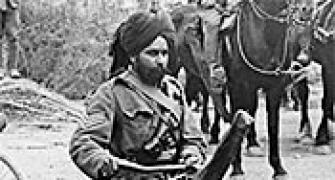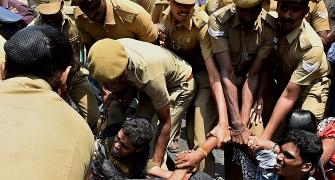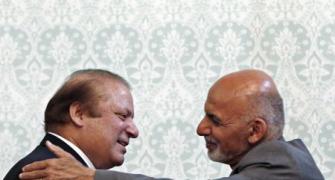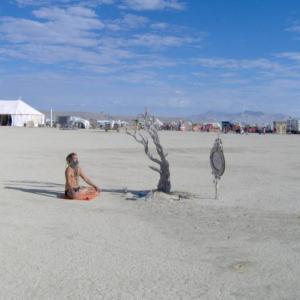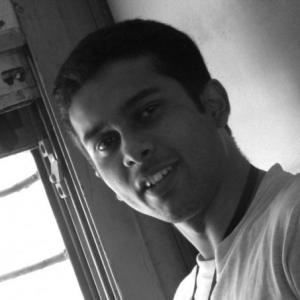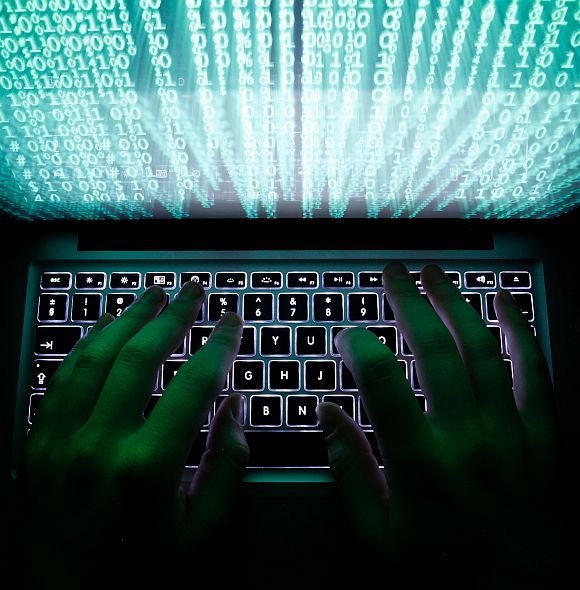
'Everywhere our younger computer professionals are in the forefront, defending our national interest in every forum and keeping our flag flying high.'
Cyber law and intellectual property expert Dr T K Viswanathan on how digital technology is changing our lives and how the State must moderate cyberspace.
Dr T K Viswanathan, 67, who retired as secretary general of the Lok Sabha in 2013, is more active than ever. In 1988 he left private legal practice and joined the ministry of law, justice & company affairs.
Since then he has served in many important institutions and positions related to the ministry. He served as law secretary from 2006 to 2009. He has a master's degree in jurisprudence from Madras University.
Presently, Dr Vishwanathan, below, left, is a consultant to President Pranab Mukherjee. His areas of interest are legal and judicial reform, cyber law, law and technology, intellectual property and international commercial arbitration.
Recently he was appointed chairman of a committee to suggest bankruptcy law reform by the finance ministry. He is also on an expert committee to review cyber laws by the home ministry.
Dr Vishwanathan recently published his thesis on the impact of technology on intellectual property with reference to copyright.
In an interview with Sheela Bhatt/Rediff.com, he speaks eloquently on issues related to the individual's right to access knowledge, cyber-crimes, intellectual property rights and digital technology.
Do you think individual technology clashes with individual freedom?
No, technology has nothing to do with individual freedom. The way people behave and the way technology functions are completely different. It has nothing to do with technology. With Android mobile technology people have better opportunities of expressing their views. That is the subject of my thesis.
How should the issue of individual freedom in cyberspace be handled by the government?
The government should not interfere in that. The government should be careful when it comes to dealing with issues related to cyberspace. See technology is moving very fast, so it is very difficult to keep pace with technology and difficult to control. So the law should not deal with every aspect of behaviour in cyberspace. It causes a lot of problems. We have to move very cautiously.
You have to be careful and balance the public interest and freedom of speech. At the same time the reputations of women are involved. Very frequently, women are a subject of harassment in cyberspace through various means and they have to be protected. Indian women being conservative in nature are reluctant to approach the police or the courts.
Day in and day our women face a lot of harassment in cyberspace and they suffer in silence. That is something that has to be addressed and I don't know how we will do that. When you give powers to the police it is always bound to be abused.
So we need to have, especially in the matters related to digital technology, personnel who are trained, sensitive, and knows the nature of cyberspace, to deal with deviance and misbehaviour in cyberspace.
At the same time you ought to see that every law is an infraction of liberty. The more laws you have, there is less of liberty. So you need to be careful when you create more offences to deal with misbehaviour in cyberspace.
It is necessary to build in safeguards to ensure that the laws are not abused. That can be only done by sensitising the enforcement agencies and also increasing the level of people who are implementing the law.
And there is also a need for creating awareness among the public about treating cyberspace as a social space and not merely as a marketplace. The rights of citizens in cyberspace, freedom of speech and tolerance to opposite viewpoints have to be respected.
At the same time we have to see that digital media and cyberspace is not used to offend or defame people especially women.
You have been in the government for such a long time and you know how everything works. Do you think the government has the knowledge about digital technology and issues related to it? Is it well prepared to face the new medium?
Of course, the government is well prepared. We have done our preparatory work well. But the thing is that law enforcement throughout the country is in the hands of the state police and that is where the problems begin.
Initially, when we were planning to enter cyberspace, we were planning on tackling the issues of e-commerce and electronic records only. We did not plan to deal with misbehaviour in cyberspace. Because dealing with deviance in cyberspace requires a lot of expertise.
Hence, cybercrimes were kept to the minimum in the Information Technology Act of 2000. Since information is the subject matter of crime and information is intangible capturing information in cyberspace poses unique problems for criminal law.
It requires expertise in digital forensics which our law enforcement agencies were lacking to begin with. However, now our law enforcement agencies have acquired the expertise are doing well in fighting cybercrime.
Still it has to trickle down to the state level. So fighting cyber crime requires expertise and a police force that is sophisticated and trained at the state level. That would take some time.
As far as the Government of India is concerned, they are well prepared and we have handled many sensitive cases. There is no wanting on the part of the Government of India, but the state governments also need to be involved in this process and capacity building needs to be done.
Do we have a well-placed judicial system to fight cases related to violations of intellectual property rights in cyberspace?
Yes we have because we have vast investment in the entertainment industry -- the Bollywood movie industry and the music industry -- and they have a very vital stake in copyright. So it can be done, but the awareness is coming only now. We have amended the Copyright Act in 2012 keeping it to world conditions.
So you know we can handle it because our investment in this area is very huge now. We succeeded in IP related battles in turmeric and other sectors. So for our indigenous knowledge and indigenous folklore, we have a separate department and they have digitised our assets in these indigenous departments. I think there is a huge separate department for traditional knowledge and there is a lot of work going on.
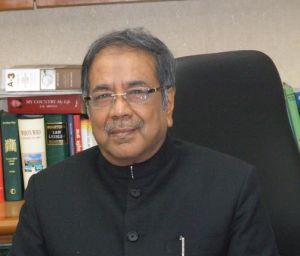 You have been law secretary and secretary general of the Lok Sabha. You could have taken up a lot of other issues to research. Why this subject related to IP?
You have been law secretary and secretary general of the Lok Sabha. You could have taken up a lot of other issues to research. Why this subject related to IP?
This subject is very crucial for the progress of mankind because information, which is the subject matter of knowledge, is sought to be clothed with the trappings of property. Intellectual property and copyrights are both monopoly rights, they are for a limited duration, but what has happened over the course of time, is that it has been taken over by media and entertainment industries to the neglect of learning and the right designed as a limited duration right has blossomed into a right in eternity.
Learning is synonymous with books. Books are the medium through which propagation of knowledge is effected and libraries are essential repositories of knowledge in public domain from where we acquire our knowledge.
The way copyright and intellectual property rights have moved, along with their advances in technology have given intellectual property rights and copyright the absolute control of ownership over information.
Information is the common heritage of mankind, which is like air or sunlight which cannot be appropriated by anybody.
Legal systems are trying to clothe it with property rights because the entertainment and media industries and because huge investment is involved. This is achieved by appropriating and controlling the use of information.
For example, you can never own a digital product, you are only a licencee by licence. So you can't use the product as the way you want. In the physical world the first sale doctrine entitles you to deal with a book which you bought to do whatever you want to do. You can loan it to anybody, give it to a library or do anything. But in case of a digital product you cannot do that, you cannot give it to anybody -- it is a licensed product.
With digital metering in place facilitated by digital technology 'pay per use, per page' will be common. So to acquire knowledge you have to pay per page, rendering knowledge acquisition expensive. This will lead to attrition of knowledge acquisition. We all attribute our knowledge to libraries, nothing is paid for, everything is free.
We were all educated in government schools, government-aided institutions, we didn't have to invest much in our education. But if everything becomes expensive because of technology and ownership over information, that would be a retrograde step.
That is why I have suggested we should have common inter-generational principles of justice. You owe your duty to future mankind.
Just like environmentalists say, you should not heat up your planet so the future generations won't have a planet to live. On the same analogy we should also leave a very rich public domain so that future generations can draw upon from that domain and build upon it a rich culture and a civilisation for the future.
That is lacking now, because the public domain has shrunk because of the excessive clothing of property rights and monopoly rights like copyrights over information. This is the real danger.
What is your final reading of the situation after doing this research?
Right now there is a movement in the US, in Latin America in Brazil and Argentina, they have all teamed up and are asking for an Access to the Knowledge Treaty (A2K) because people right now are only concerned with the media and entertainment industries. There is not much concern about advancement of learning and knowledge.
Argentina and Brazil have moved a resolution that they want to have a body, a UN convention, to chart out an access to knowledge treaty where knowledge is available to all the developing countries and is not monopolised by those who own them.
In this context it is also essential that traditional knowledge is not stolen and monopolised by Western countries.
What will happen in India eventually? Very few people have access to digital knowledge and a lot of people are still outside it and the digital inequality is stark.
The digital divide is fast closing because the medium is no longer confined only to just computers. It has permeated into cell phones, e-readers etc. Today, information and media content is exploding through cell phones and other handheld digital devices. Nobody needs to sit in front of the computer to access information. So that gap is closing very fast.
Who would have thought that servants and milkmen would carry cell phones ten years ago, but it has happened. Now with the help of software, on the Internet you can find instantaneous translation of what is spoken or typed. You speak something, and some other person listens instantly because of the instantaneous translation facility afforded through the Internet.
In digital technology everything is 0 and 1, bits and bytes. It can be music, media, letters, it takes anything. A time will come when knowledge will be codified and there will be software to extract that knowledge in whatever language you want.
With digitisation of information, linguistic barriers break down and lack of language proficiency will not be a serious hurdle in communication.
It is like God communicating to us as he can communicate in any language.
What is your advice on the issue of IP and digital technology?
Now we are voicing our concerns since we have very vital stakes in the information society which is emerging. We missed the industrial revolution because of certain historical reasons, but the digital revolution is the creation of our young software professionals.
India has a vital stake in the digital renaissance which is taking shape. Everywhere our younger computer professionals are in the forefront, defending our national interest in every forum and keeping our flag flying high.
The government has said it is looking into the issue of Net Neutrality. Information Technology Minister Ravi Shankar Prasad claims the report has not come yet. Don't you think the issue of Net Neutrality concerns the social and individual freedom which hardly deserves a second look? Is there any dubious play here?
Knowledge and information which is the raw material of knowledge is Res Nullius -- a resource, common to the entire mankind. No one can appropriate it just as no one can appropriate nature's forces like air and water.
Knowledge in the public domain is free, but in the digital era bandwidth and spectrum it is not.
Auctioning of a public resource like spectrum ultimately has a spillover effect on the end-users basic right to Internet access which is a logical corollary of the right to lead a dignified human existence. My view is echoed by Tim Berners-Lee, credited with creating HTML, who has called upon very recently for a Digital Magna Carta.
Berners-Lee, the computer scientist credited with the original invention of the World Wide Web in 1990, says it is time for the Web to become a granted human right. With a veiled reference to Net Neutrality, he insinuates that transmissions should be made without interference, while the privacy and freedom of the users stay protected.
(Read more here (external link).)
The remarks were made along with the release of a report that tracks the impact of the Internet around the globe. What can I say more? Three cheers for Tim Berners-Lee.

